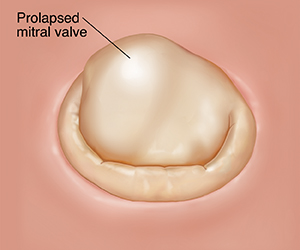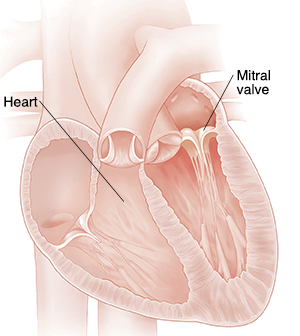Heart Valve Problems: Mitral Valve Prolapse
Heart Valve Problems: Mitral Valve Prolapse
Mitral valve prolapse is the most common heart valve problem. With this condition, the valve that separates the chambers of the left side of the heart doesn’t open and close as it should. Extra tissue in the valve can stop it from closing properly. This can make the valve leaky.
Most cases of mitral valve prolapse are not serious. Usually only a small amount of blood leaks backward. This does not cause problems and doesn't need treatment. But sometimes a larger amount of blood can leak backward. This can lead to a serious problem as the blood that leaks backward must be pumped twice, which eventually takes a toll on the heart. You will need surgery to fix it.
Prolapsed mitral valve viewed from top. |
Cross section of heart showing mitral valve prolapse. |
Symptoms of mitral valve prolapse
Mitral valve prolapse may not cause symptoms. If you do have symptoms, you may feel one or more of the following:
Mild chest pain
Pounding or racing heart (palpitations)
Shortness of breath when lying down
Trouble breathing with activity
Possible causes
Mitral valve prolapse is often present from birth. But some people can develop it later in life. In some cases, the condition is passed down from your parents (inherited).
Treating mitral valve prolapse
Most people with mitral valve prolapse have mild disease that does not get worse. It doesn't need to be treated. But sometimes the valves get more stretched out over time and can cause symptoms. Medicines can help relieve symptoms. Your doctor may ask you to come in from time to time for tests to check your heart valve and to be sure the problem hasn’t gotten worse. In severe cases, surgery to repair or replace the valve may be needed.
Updated:
August 07, 2018
Sources:
Definition and Diagnosis of Mitral Valve Prolapse, Up To Date
Reviewed By:
Fetterman, Anne, RN, BSN,Gandelman, Glenn, MD, MPH,Images reviewed by StayWell medical illustration team.

